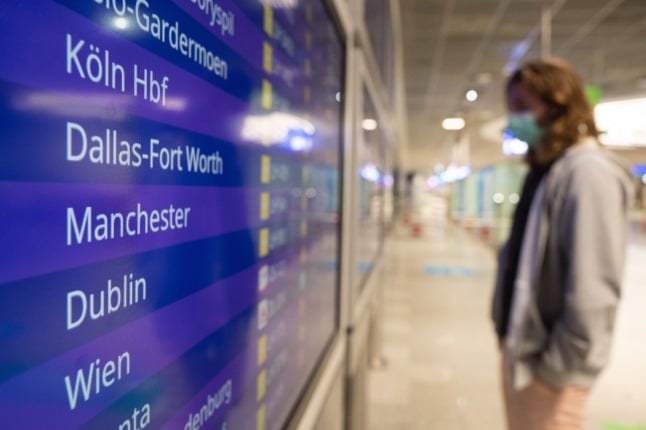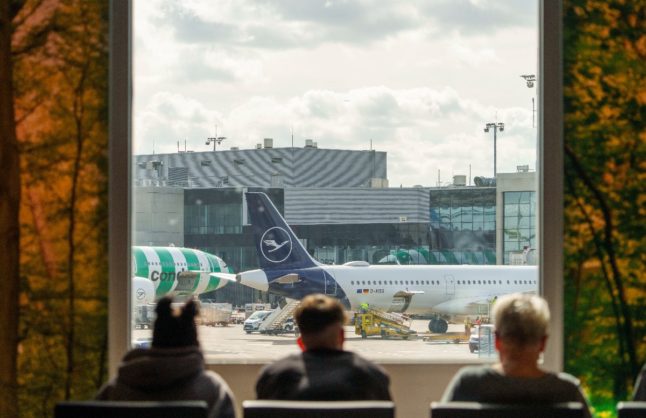Transport Secretary Grant Shapps announced that from July 19th, people visiting amber list countries including Germany would no longer have to quarantine on arrival back in England, as long as they were fully vaccinated.
However, this exemption is only aimed at UK nationals living in Britain and vaccinated there. That rules out the majority of Brits in Germany.
As it stands, they will still have to quarantine for 10 days – with the possibility of ending it in England after a negative test taken on the fifth day – when visiting friends or family in the UK, even if they are fully vaccinated.
But this could change if Germany is put on the green list when the UK reviews the country rules later this week.
Shapps’ announcement came just one day after Germany downgraded the risk status of the UK, meaning that fully jabbed people can come to Germany without having to quarantine.
UPDATE: What rules do European countries have for travellers from the UK?
Shapps said the exemption was for “residents returning to England”.
TRAVEL UPDATE: From MONDAY 19 JULY 4am #British fully vaccinated adults will not need to isolate from amber list countries 🚦 including those on clinical trials – another step to fully reopening international travel. Children under 18 will not need to self-isolate.
— Rt Hon Grant Shapps MP (@grantshapps) July 8, 2021
The Department for Transport confirmed to The Local that this exemption is for anyone who was vaccinated in the UK or part of a UK clinical trial on vaccines.
This means that any UK nationals living in Italy who had their jabs in Britain can travel quarantine-free.
However, those vaccinated in Germany will still face a 10-day quarantine if they want to travel to the UK to visit friends and family, as well as needing to pay around £175 – or more – for the compulsory travel testing package.
What’s the reaction from Brits in Germany?
British citizens resident in Germany and other countries in Europe reacted with anger and sadness at the news that they would not be exempt from the UK’s quarantine requirement.
The campaign group British in Europe summed up the mood when they tweeted: “We just want to see our families.”
The move has thrown people’s plans into the air.
Ross Lowe said he was desperate to go home from Germany to the UK with his wife and new baby. The couple are fully vaccinated. However, the quarantine costs and timings “make it impossible”, he said.
My wife and I have both had our Pfizer jabs here in Germany, where we currently live and work. We also now have a 10-week old baby who hasn't met her grandma yet. We desperately want to get home but the quarantine costs and timings make it impossible.
— Ross Lowe (@RossBits) July 8, 2021
Matt Bristow, from rights group British in Germany, said British in Europe planned to write to Grant Shapps.
He said the group understood that public health has to remain a top priority.
“But what we can’t understand is that British citizens are being treated differently if they live in Germany or other parts of the EU compared to a British citizen who lives in England,” he said.
“There doesn’t seem to be a scientific or public health basis for that so that’s why it seem to be really confusing and feels rather discriminatory.
“For some people this could be a frustration but they’ll have family in the UK who can visit them instead. But that’s not possible for everyone.”
Bristow said people had contacted the group on Twitter saying their parents are seriously unwell in the UK – and they can’t visit them.
Although there are exceptions on compassionate grounds, the rules are still very strict.
“They’ll be people where a family member has had a baby and they’d like to have a visit and support the family,” added Bristow.
“For a lot of people this will cause some serious difficulty. It feels really unfair.”
‘Gutted’
Joe Lee-Dowd said on Twitter: “Gutted, as like many people I punched the air with joy when I saw the headline of the policy change this morning. Briefly thought that I would be able to make a camping trip for one of my best mate’s mini-stags after all!”
Others said they made an effort to get fully jabbed before travel – and planned their holiday days from work around not having to quarantine.
Miserable – I am moving back to the UK at the end of the month and brought my second jab forward because I thought it would help. Now i’ll go straight into quarantine and won’t be able to see my family (who I haven’t seen since 2019) before I start working again.
— samuel (@allotmenttomat) July 8, 2021
Helen Albert said: “It’s pretty stupid to be honest. I can see that they might only want to accept UK-approved vaccines, but to restrict it to ones done in the UK only doesn’t make a lot of sense to me! As long as decent form of proof is used, like EU digital certificate, I can’t see the problem!”
People also questioned why some UK authorities had also agreed to let up to 1,000 football fans travel quarantine-free from Italy to London for Sunday’s Euro 2020 final.
People who the UK will let in without quarantining:
1) Italians who want to watch football.
2) Brits returning from a fortnight in Shagaluf.People the UK refuses to admit w/o quarantine:
1) Fully vaccinated Brits living in the EU who haven’t seen their families for a year.
— James Savage (@SavLocal) July 8, 2021
The feeling from Brits in Germany – many of whom haven’t seen their family in months or even years – is that they’ve been forgotten – and summer holidays for Brits in the UK have been put at the top of the agenda.
🇬🇧 New UK travel rules in a nutshell:
🏝 Great for British sunseekers
💔 Disastrous for family reunions pic.twitter.com/eA7SLMsODL— Trent Murray (@trent_murray) July 8, 2021
However, there is some hope that things won’t stay the same.
The Local spoke to an EU source about the mutual recognition of Covid certificates in the EU and the UK.
The European Commission source told us: “When it comes to the UK, the talks are ongoing at the technical level and are progressing well and going in the right direction.
“This is in particular because technically speaking the EU’s and the UK’s architectures are aligned.
“On the US, the EU continues exchanges with the US on the use of (vaccination) certificates to facilitate travel. We are also following closely how the debate on the certificates evolves in the US.”
The UK’s Department of Transport said that a further announcement on fully-vaccinated non-EU residents is expected before the end of the month.
Shapps said that ministers are “actively working” on proposals to allow people who’ve received their jabs outside the UK to be exempt from quarantine rules when travelling from amber list countries.
He suggested people in the EU could be allowed in sooner than those in the US due to the digital vaccine pass scheme being rolled out.
What are the rules for travelling from the UK to Germany?
On July 7th, Germany eased travel rules for the UK – along with four other countries where the Delta variant of Covid is widespread. The UK is now in the the ‘high incidence’ risk category rather than on the ‘virus variant’ list.
People who are fully vaccinated or have recovered from Covid-19 coming from high incidence areas like the UK do not have to quarantine on arrival. They can also show their proof of vaccination/recovery before boarding a flight to Germany instead of a negative Covid test.
People coming from high incidence areas who aren’t vaccinated have to show a negative Covid test before departure to Germany, and quarantine for 10 days on arrival with the option to end it after five days with a negative Covid test.
Everyone has to log proof of test, vaccination or record on Germany’s entry registration portal before travel.
The German government still warns against travel to high incidence areas, but there are no bans in place.
READ MORE: Germany’s new travel rules for the UK, Portugal and India



 Please whitelist us to continue reading.
Please whitelist us to continue reading.
I watched Grant Shapps announce this in Parliament yesterday and was shocked and angry when it sunk in that it was only for Brits that have been fully vaccinated by the NHS. That it was yet another opportunity snatched by the despicable and divisive Tories to snub the EU and reinforce the imperial mindset that is Britishness at its worst. I can only hope that Spain, Portugal and Greece change their policy when the British are in mid flight and make them quarantine for 10 days once they’ve landed!
I’m with you – ridiculous policy that has no scientific reasons behind it.
Governed by mediocracy
Andy
This is the most ridiculous thing since Brexit. All UK citizens living in Europe and having had the 2 jabs are being persecuted when consideration is now being given to allow non-EU residents to travel without having to quarantine. Talk about feeling like second-class citizens. We have not seen our parents since November 2019 and last year was my mother’s 90th. Birthday which we celebrated on Skype. It is time the European Union acted on our behalf. If we were diplomats’ action would be taken as reciprocation.
Yes my brother and I haven’t seen our Dad and the rest of the family since the beginning of September. My brother is doubled jabbed. I am not having any jabs after being very seriously ill from a flu jab after which I was told not to have any flu/pneumonia or similar by the Doctors in my then employers health clinic. Trying to get an exemption certificate is almost impossible. My Dad is 99 and refused it. We need to get over to Wiltshire to assist our sisters on clearing the house of all the accumulated junk. My brother can’t have 4 weeks off work 2 of them in quarantine in the UK. He has so much work backlog (as a building tech). I’m retired so it doesn’t matter for me. Last time I came they didn’t even bother to look at my form at Heathrow they just brushed it aside. Germany should be on the Green List. As for only NHS jabs accepted that’s ridiculous it’s medical apartheid/discrimination. The AstraZ jab is no different in Germany to the UK AZ jab.
Ludicrous UK policy, but then it is typical of the shambolic approach displayed by the so-called government in response to the pandemic. I can well appreciate the distress caused to those awaiting family reunions, but for myself I wouldn’t in any event go near the place with the current infection rates there.